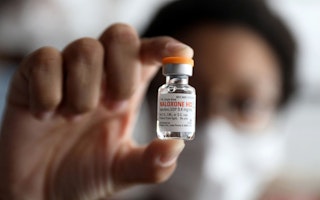Ukraine: Shining Light on a Silent Epidemic
By Azzi Momenghalibaf

Globally, an estimated 180 million people are living with hepatitis C (HCV). Highly transmissible through blood, HCV disproportionately affects people who inject drugs, with prevalence at 80 percent or higher in some drug-injecting populations. But this disease is not limited to people who use drugs—high infection rates have also been recorded among both the general public and, in particular, medical professionals.
With some 400,000 injection drug users, Ukraine is home to one of the largest HCV epidemics in the world. Yet, though as many as an alarming 1 million people in Ukraine are living with HCV, there is little to no access to treatment.
Indeed, the prohibitively high price of pegylated interferon—one of the few drugs found so far to be effective in treating HCV—prevents patients in not only Ukraine but worldwide from getting necessary treatment. The two forms of pegylated interferon most widely available today remain under patent by a pair of pharmaceutical companies, US-based Merck and Switzerland-based Roche. This duopoly results in the cost of the treatment ranging from $10,000 to $30,000. (Recently the U.S. Food and Drug Administration approved two new therapies for HCV—or new “hope” as media reports invariably referred to them. At nearly $50,000 for a course, and to be used with pegylated interferon, they’re unlikely to offer relief to marginalized populations.)
Still, the issues in accessing treatment run deeper than cost. Diagnostics are also often unavailable, and a lack of awareness on the part of medical professionals, government and the general public serves to fuel HCV’s spread.
Ukrainians face all these barriers. As the video above demonstrates, it is nearly impossible to get a basic diagnostic test. Made by the organization Light of Hope, an Open Society Foundations grantee, the video records, using a hidden camera, one Ukrainian man’s interactions with local health officials in the city of Poltava as he tries to find out if he is living with HCV.
Despite the country’s relatively developed health system, only pregnant women, blood donors, and people entering the military in Ukraine currently are required to be tested for HCV and therefore qualify for free testing. But even patients who are willing to pay are sometimes turned away.
Light of Hope’s video, however, has already made an impact. In Poltava, local authorities have committed to developing a regional HCV program that includes improved access to testing. The Ukrainian government, too, is in the process of establishing a national program on HCV. And civil society groups such as Light of Hope are working hard to ensure this momentum will swell into an even greater number of adequate resources being allocated to this critical public health problem going forward.
More information on HCV and drug use can be found on the Eurasian Harm Reduction Network website.
Until November 2021, Azzi Momenghalibaf was a senior program officer with the Open Society Public Health Program.

